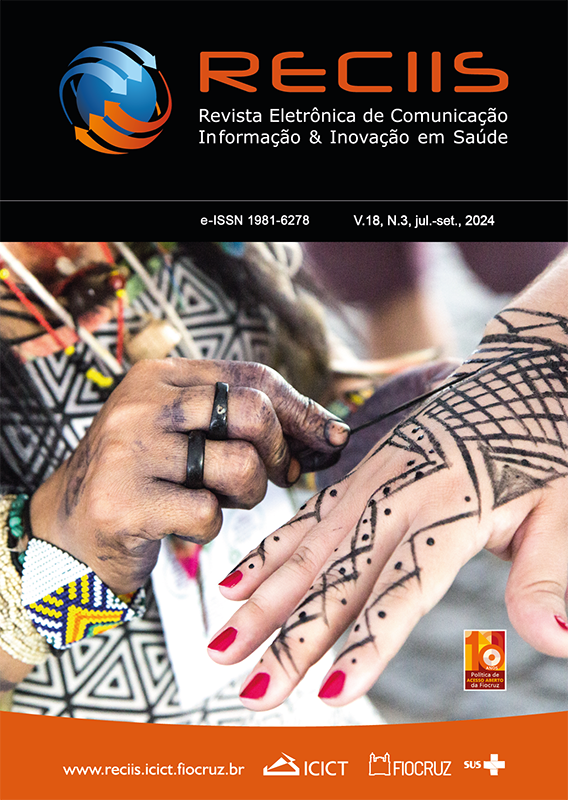Conjunctural issues in AI regulation
DOI:
https://doi.org/10.29397/reciis.v18i3.4634Keywords:
Artificial intelligence regulation, Automated systems, Transparency, Explainability, Digital and data sovereigntyAbstract
The text begins by addressing the debate surrounding the regulation of existing artificial intelligence (AI), divided between two poles: the protection of innovation and the need to mitigate social and environmental risks. It progresses to highlight the colossal concentration of computational power and data in the hands of digital oligopolies, the big tech companies. The text raises concerns about the impact of this concentration on digital sovereignty and the country’s ability to control its infrastructures and data. It argues that the lack of transparency and explainability in AI systems exacerbates the risks of discrimination and social exclusion. The text advocates that AI regulation should ensure rights, safeguard sovereignty, and promote an autonomous and inclusive digital ecosystem.
References
BRATTON, Benjamin H. The stack: on software and sovereignty. Cambridge, MA: MIT Press, 2016.
COULDRY, Nick; MEJIAS, Ulises A. The costs of connection: how data is colonizing human life and appropriating it for capitalism. Redwood City: Stanford University Press, 2020.
KWET, Michael. Digital colonialism: US empire and the new imperialism in the Global South. Race & Class, [s. l.], v. 60, n. 4, p. 3-26, 2019. DOI: https://dx.doi.org/10.2139/ssrn.3232297. Disponível em: https://papers.ssrn.com/sol3/papers.cfm?abstract_id=3232297. Disponível em: 10 set. 2024.
MASLEJ, Nestor et al. The AI index 2024 annual report. Stanford: AI Index Steering Committee; Institute for Human-Centered AI; Stanford University, 2024.
MAYER-SCHÖNBERGER, Viktor; CUKIER, Kenneth. Big data: a revolution that will transform how we live, work, and think. Boston: Houghton Mifflin Harcourt, 2013.
MICROSOFT destaca Sisu em nuvem como case de sucesso. Portal do MEC, Brasília, DF, 23 mar. 2020. Disponível em: http://portal.mec.gov.br/ultimas-noticias/410-sisu-535874847/86661-microsoft-destaca-sisu-em-nuvem-como-case-de-sucesso#:~:text=A%20Microsoft%20destacou%20o%20Sistema,aumentar%20a%20capacidade%20de%20acessos. Acesso em: 26 ago. 2024.
MILLER, Katharine. Should AI models be explainable? That depends. HAI, Stanford, 16 mar. 2021. Disponível em: https://hai.stanford.edu/news/should-ai-models-be-explainable-depends. Acesso em: 8 set. 2024.
MIT TECHNOLOGY REVIEW INSIGHTS. The great acceleration: CIO perspectives on generative AI. São Francisco: Databricks, 2023.
MOROZOV, Evgeny. Big tech: a ascensão dos dados e a morte da política. São Paulo: Ubu, 2018.
PASQUALE, Frank. The black box society: the secret algorithms that control money and information. Cambridge, MA: Harvard University Press, 2015.
PASQUINELLI, Matteo; JOLER, Vladan. O manifesto nooscópio: inteligência artificial como instrumento de extrativismo do conhecimento. Tradução: Leandro Módolo e Thais Pimentel. Lavits, [s. l.], 30 jul. 2020. Disponível em: https://lavits.org/o-manifesto-nooscopio-inteligencia-artificial-como-instrumento-de-extrativismo-do-conhecimento/. Acesso em: 8 set. 2024.
PIGOU, Arthur. The economics of welfare. Abingdon: Routledge, 2017.
SILVA, Tarcízio. Racismo algorítmico: inteligência artificial e discriminação nas redes digitais. São Paulo: Edições Sesc, 2022.
SKINNER, Quentin. The sovereign state. In: KALMO, Hent; SKINNER, Quentin (ed.). A genealogy. Sovereignty in fragments: The past, present and future of a contested concept. Cambridge, UK: Cambridge University Press, 2010.
SRNICEK, Nick. Platform capitalism. Hoboken: John Wiley & Sons, 2017.
STERLING, Bruce. Web semantics: Microsoft Project Turing introduces Turing Natural Language Generation (T-NLG). Wired, San Francisco, 13 feb. 2020.
TECNOLOGIA de reconhecimento facial na chamada chega a 1,6 mil colégios da rede estadual. Agência Estadual de Notícias, Curitiba, 17 maio 2023. Disponível em: https://www.aen.pr.gov.br/Noticia/Tecnologia-de-reconhecimento-facial-na-chamada-chega-16-mil-colegios-da-rede-estadual. Acesso em: 26 ago. 2024.
VAN DIJCK, José; POELL, Thomas; DE WAAL, Martijn. The platform society: public values in a connective world. Oxford: Oxford University Press, 2018.
WINNER, Langdon. Do artifacts have politics? In: WINNER, Langdon. The whale and the reactor: a search for limits in an age of high technology. Chicago: The University of Chicago Press. 1986.
ZUBOFF, Shoshana. The age of surveillance capitalism: the fight for a human future at the new frontier of power. London: Profile Books, 2019.
Downloads
Published
How to Cite
Issue
Section
License
Copyright (c) 2024 Sergio Amadeu Silveira

This work is licensed under a Creative Commons Attribution-NonCommercial 4.0 International License.
Author’s rights: The author retains unrestricted rights over his work.
Rights to reuse: Reciis adopts the Creative Commons License, CC BY-NC non-commercial attribution according to the Policy on Open Access to Knowledge by Oswaldo Cruz Foundation. With this license, access, download, copy, print, share, reuse, and distribution of articles is allowed, provided that it is for non-commercial use and with source citation, granting proper authorship credits and reference to Reciis. In such cases, no permission is required from the authors or editors.
Rights of authors’s deposit / self-archiving: The authors are encouraged to deposit the published version, along with the link of their article in Reciis, in institutional repositories.












